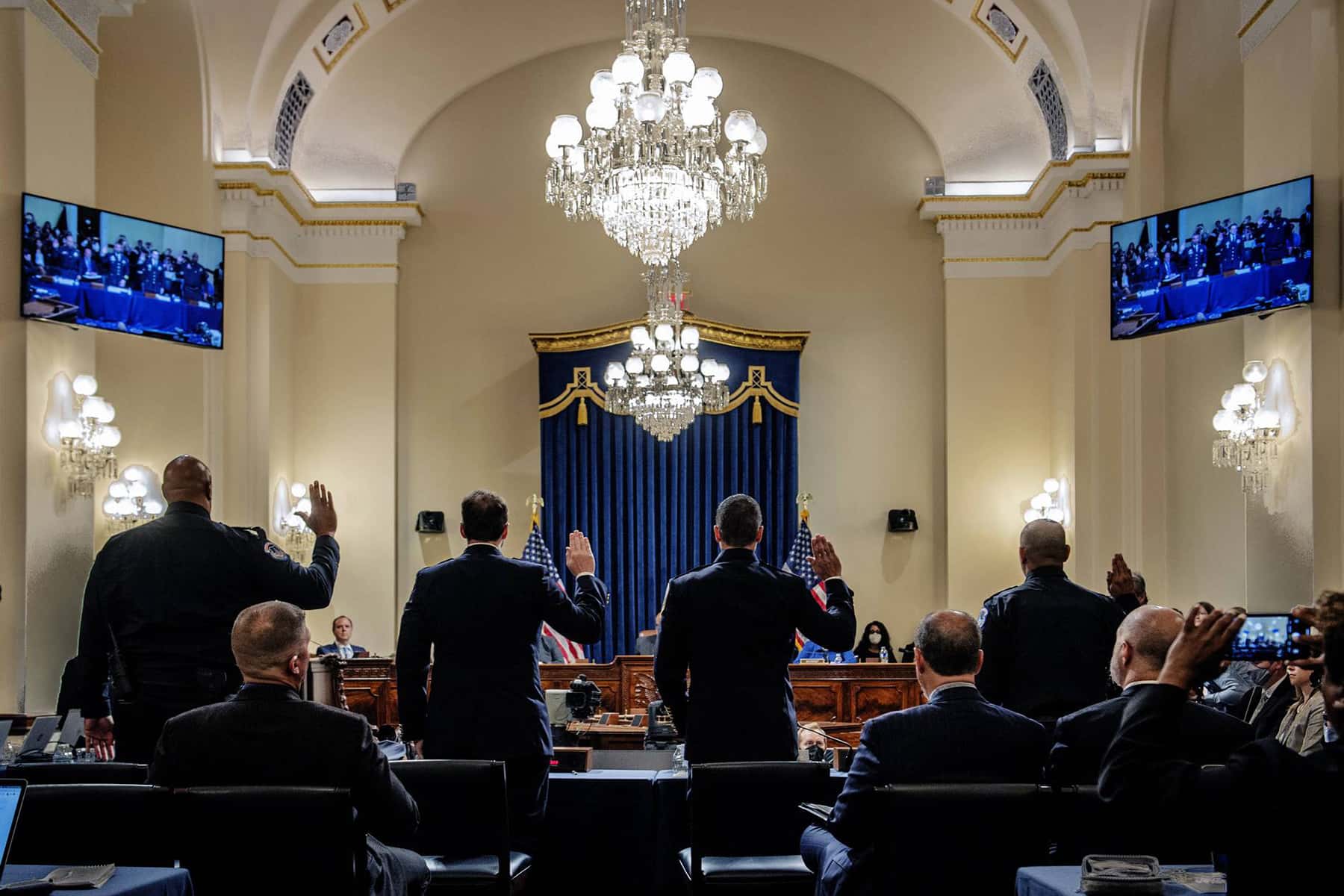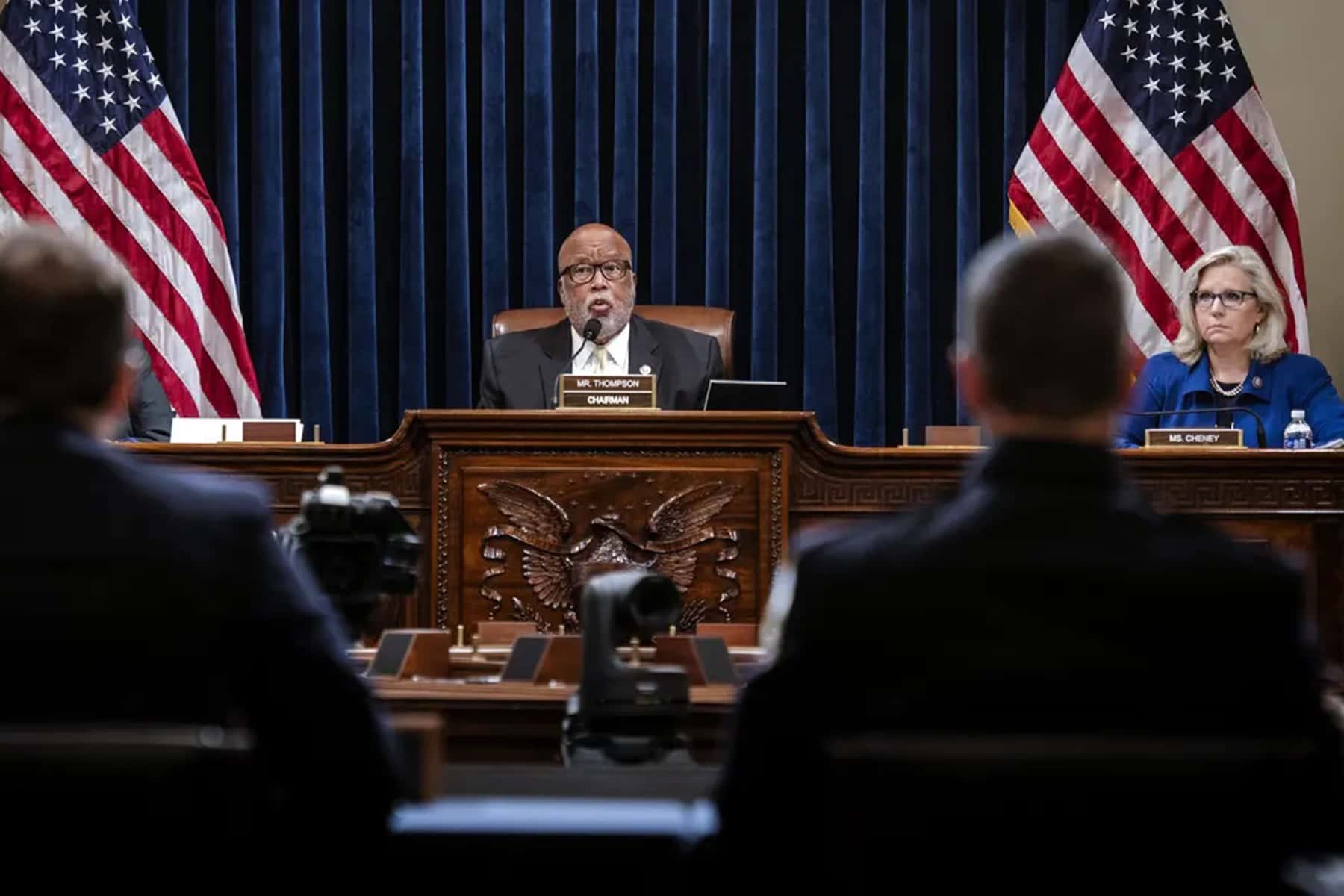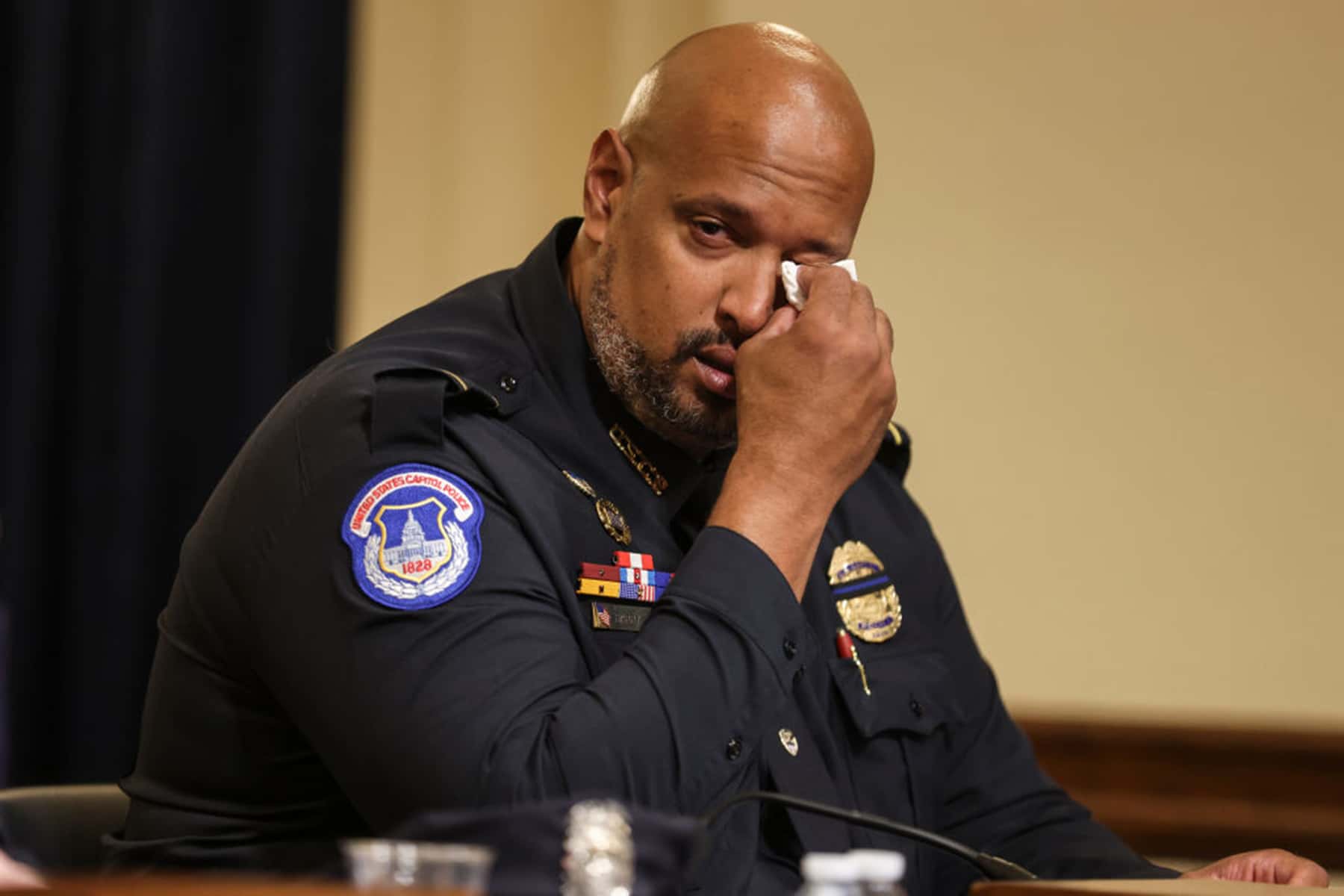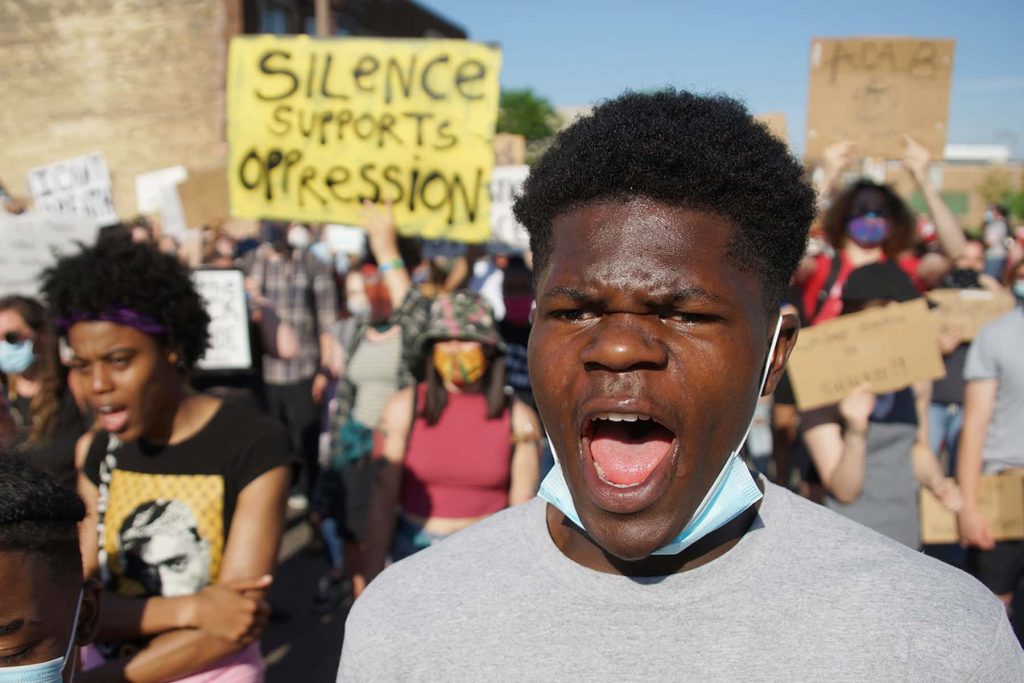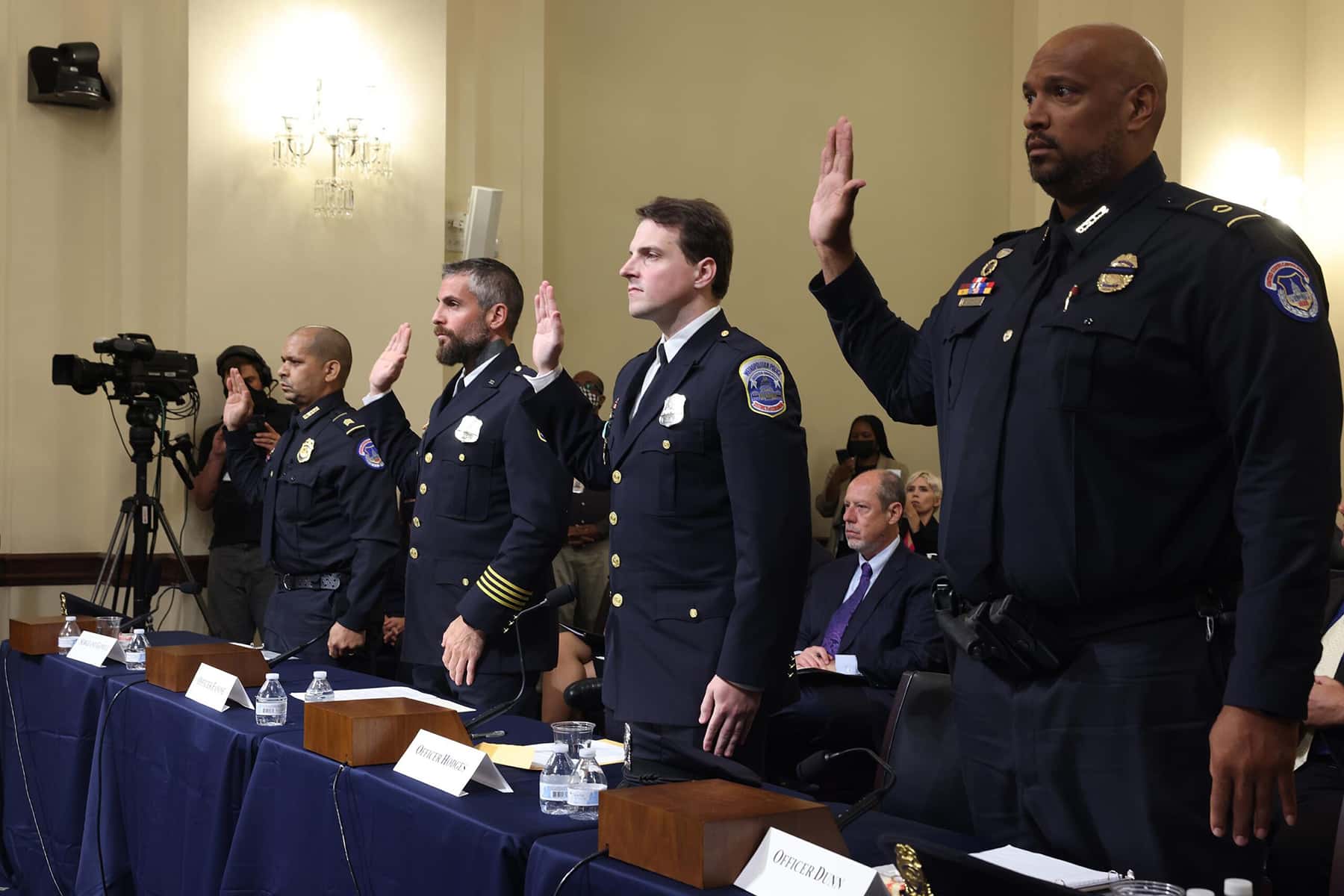
In early July, the Bullock Texas State History Museum cancelled a book event three and a half hours before it was supposed to start.
After Representatives Bennie Thompson (D-MS) and Liz Cheney (R-WY) opened the hearing, Sergeant Aquilino Gonell and and Officer Harry Dunn of the Capitol Police, and Officer Michael Fanone and Officer Daniel Hodges of the Metropolitan Police, recounted hand-to-hand combat against rioters who were looking to stop the election of Democrat Joe Biden and kill elected officials whom they thought were standing in the way of Trump’s reelection. They gouged eyes, sprayed chemicals, shouted the N-word, and told the officers they were going to die. They said: “Trump sent us.”
Lawmakers questioning the officers had them walk the members through horrific video footage taken from the officers’ body cameras. The officers said that one of the hardest parts of the insurrection for them was hearing the very people whose lives they had defended deny the horror of that day. They called the rioters terrorists who were engaged in a coup attempt, and called the indifference of lawmakers to those who had protected them “disgraceful.” “I feel like I went to hell and back to protect them and the people in this room,” Fanone said. “But too many are now telling me that hell doesn’t exist, or that hell wasn’t actually that bad.”
The officers indicated they thought that Trump was responsible for the riot. When asked if Trump was correct that it was “a loving crowd,” Gonell responded: “To me, it’s insulting, just demoralizing because of everything that we did to prevent everyone in the Capitol from getting hurt…. And what he was doing, instead of sending the military, instead of sending the support or telling his people, his supporters, to stop this nonsense, he begged them to continue fighting.” The officers asked the committee to make sure it did a thorough investigation. “There was an attack carried out on January 6, and a hit man sent them,” Dunn testified. “I want you to get to the bottom of that.”
“There are some who express outrage when someone kneels while calling for social justice. Where are those same people expressing outrage to condemn the violent attack on law enforcement, the Capitol and on our American democracy?” – Sgt. Aquilino Gonell
The Republicans on the committee, Representatives Adam Kinzinger (IL) and Cheney pushed back on Republican claims that the committee is partisan.
“Like most Americans, I’m frustrated that six months after a deadly insurrection breached the United States Capitol for several hours on live television, we still don’t know exactly what happened,” Kinzinger said. “Why? Because many in my party have treated this as just another partisan fight. It’s toxic and it’s a disservice to the officers and their families, to the staff and the employees in the Capitol complex, to the American people who deserve the truth, and to those generations before us who went to war to defend self-governance.”
Kinzinger rejected the Republican argument that the committee should investigate the Black Lives Matter protests of summer 2020, saying that he had been concerned about those protests but they were entirely different from the events of January 6: they did not threaten democracy. “There is a difference between breaking the law and rejecting the rule of law,” Kinzinger observed. Research shows that more than 96% of the BLM protests had no violence or property damage.
The officers and lawmakers both spoke eloquently of their determination to defend democracy. Sergeant Gonell, a U.S. Army veteran of the Iraq War who emigrated from the Dominican Republic, said: “As an immigrant to the United States, I am especially proud to have defended the U.S. Constitution and our democracy on January 6.” Adam Schiff (D-CA) added: “If we’re no longer committed to a peaceful transfer of power after elections if our side doesn’t win, then God help us. If we deem elections illegitimate merely because they didn’t go our way rather than trying to do better the next time, then God help us.”
Cheney said: “Until January 6th, we were proof positive for the world that a nation conceived in liberty could long endure. But now, January 6th threatens our most sacred legacy. The question for every one of us who serves in Congress, for every elected official across this great nation, indeed, for every American is this: Will we adhere to the rule of law? Will we respect the rulings of our courts? Will we preserve the peaceful transition of power? Or will we be so blinded by partisanship that we throw away the miracle of America? Do we hate our political adversaries more than we love our country and revere our Constitution?”
House Minority Leader Kevin McCarthy (R-CA) and Senate Minority Leader Mitch McConnell (R-KY) both said they had been too busy to watch the hearing. But the second-ranking Republican in the Senate, John Thune of South Dakota, called the officers heroes and said: “We should listen to what they have to say.”
Republicans are somewhat desperately trying to change the subject in such a way that it will hurt Democrats. Shortly before the hearing started, House Republican conference chair Elise Stefanik (R-NY), who was elected to that position after the conference tossed Cheney for her refusal to support Trump after the insurrection; and Jim Banks (R-IN), whom McCarthy tried to put on the committee and who promised to undermine it, held a press conference. They tried to blame House Speaker Nancy Pelosi (D-CA) for the attack on the Capitol, a right-wing talking point, although she, in fact, has no control over the Capitol Police.
Shortly after the hearing’s first day ended, some of the House’s key Trump supporters — Andy Biggs (R-AZ), Matt Gaetz (R-FL), Louie Gohmert (R-TX), Bob Good (R-VA), Paul Gosar (R-AZ), and Marjorie Taylor Greene (R-GA) — tried to hold a press conference in front of the Department of Justice, where they promised to complain about those arrested for their role in the January 6 insurrection, calling them “political prisoners.” The conference fell apart when protesters called Gaetz a pedophile – he is under investigation for sex trafficking a girl, and blew a whistle to drown the Republican lawmakers out.
This story is not going away, not only because the events of January 6 were a deadly attack on our democracy that almost succeeded and we want to know how and why that came to pass, but also because those testifying before the committee are under oath.
Since the 1950s, when Senator Joe McCarthy (R-WI) pioneered constructing a false narrative to attract voters, the Movement Conservative faction of the Republican Party focused not on fact-based arguments but on emotionally powerful fiction. There are no punishments for lying in front of television cameras in America, and from Ronald Reagan’s Welfare Queen to Rush Limbaugh’s “Feminazis” to the Fox News Channel personalities’ warnings about dangerous Democrats to Rudy Giuliani’s “witnesses” to “voter fraud” in the 2020 election, Republicans advanced fictions and howled about the “liberal media” when they were fact-checked. By the time of the impeachment hearings for former president Trump, Republican lawmakers like Jim Jordan (R-OH) didn’t even pretend to care about facts but instead yelled and badgered to get clips that could be arranged into a fictional narrative on right-wing media.
Now, though, the Movement Conservative narrative that “socialist” Democrats stole the 2020 election, a narrative embraced by leading Republican lawmakers, a story that sits at the heart of dozens of voter suppression laws and that led to one attempted coup and feeds another, a narrative that would, if it succeeds, create a one-party government, is coming up against public testimony under oath.
“The American people deserve the full and open testimony of every person with knowledge of the planning and preparation for January 6th,” Cheney said. “We must also know what happened every minute of that day in the White House — every phone call, every conversation, every meeting leading up to, during, and after the attack.” She added: “We must issue and enforce subpoenas promptly.”
As the House Select Committee to Investigate the January 6th Attack on the United States Capitol starts its work, former president Trump and his supporters are consolidating their power over the Republican Party. Through it, they hope to control the nation.
Trump tried to assert his dominance over the party by issuing a statement in which he demanded that Republican senators scrap the infrastructure bill that has been more than three months in the making. Although he did not note any specific provisions in the bill, he claimed that senators were getting “savaged” in the negotiations because McConnell “and his small group of RINOs wants nothing more than to get a deal done at any cost to prove that he can work with the Radical Left Democrats.” Trump ordered lawmakers not to do an infrastructure deal “until after we get proper election results in 2022 or otherwise…. Republicans,” he ordered, “don’t let the Radical Left play you for weak fools and losers!”
The term “RINO” comes from the 1990s, when the Movement Conservatives taking over the Republican Party used it to discredit traditional Republicans as “Republicans In Name Only.” It reversed reality—the Movement Conservatives were the RINOs, not the other way around—but it worked. Movement Conservatives, who wanted to get rid of the New Deal and take the government back to the 1920s, pushed aside traditional Republicans who agreed with Democrats that the government should regulate business, provide a basic social safety net, and promote infrastructure.
Now, the former president is doing the same thing: claiming that the Movement Conservatives who now dominate the leadership of the Republican Party are not really Republicans. True Republicans, he says, are those loyal only to him.
He is using the infrastructure bill as a loyalty test. The reality is that an infrastructure package is very popular, and walking away from it will cost Republicans in states that are not fully under Trump’s sway. A new poll by the Associated Press and NORC at the University of Chicago (NORC is the nonpartisan National Opinion Research Center affiliated with the university) finds that 83% of Americans, including 79% of Republicans and 80% of Independents, want funding for roads, bridges, and ports. Sixty-six percent of Americans, including 43% of Republicans and 53% of Independents, want to pay for it with higher taxes on corporations.
Walking away from those kinds of numbers seems like political poison, and yet the discussions to whip the bipartisan bill into shape seemed to veer off track. The demand for Republican loyalty is playing out as the January 6 committee gets down to business. Organizing that committee drove a wedge through Republican lawmakers. After an initial period in which leaders like McCarthy and McConnell expressed outrage and a desire to learn what had created the January 6 crisis, the leaders have lined up behind the former president. Emboldened, Trump’s supporters have become more aggressive in their insistence that they, not those interested in stopping a future insurrection, are the good guys.
After Republican senators rejected the establishment of a bipartisan select commission and House Speaker Nancy Pelosi (D-CA) set up a House select committee instead, McCarthy tried to sabotage the committee by putting on it two extreme Trump supporters out of the five slots he was assigned. He named Jim Jordan (R-OH) but pretty clearly expected Pelosi would toss him and put up with Jim Banks (R-IN), whom McCarthy had named the ranking member of the committee. Banks was on record attacking the committee as a leftist plot, and could undermine the committee’s work while getting enough media time to launch him as a national political candidate – his hiring of Fox News Channel host Tucker Carlson’s son long before this indicated his hope for good media coverage for a possible swing at a higher office.
But Pelosi did not play. She refused to accept either Jordan or Banks, prompting McCarthy to pull all five of his nominees. She had already chosen Cheney as one of her eight seats on the committee; she added Kinzinger as well. Both Cheney and Kinzinger are Movement Conservatives, but they are not willing to jump on the Trump bandwagon.
When PBS correspondent Yamiche Alcindor asked McCarthy what he thought of Cheney and Kinzinger’s participation on the committee, he called them “Pelosi Republicans.” He has suggested that they might face sanctions from the party for their cooperation with the committee.
Both Cheney and Kinzinger voted for Trump. Cheney voted with Trump more than 90% of the time. Kinzinger voted with him 99% of the time in the president’s first two years in office. Trying to make them into Democrats because they did not support the insurrection is a double-edged sword. McCarthy is trying to read them out of the Republican Party, for sure, but he is also tying the entire party to Trump, and it seems likely—from Trump’s rising panic, if nothing else—that the committee will discover things that will not show the former president and his supporters in a good light.
Representative Bennie G. Thompson (D-MS), chair of the select committee and of the House Homeland Security Committee, published an op-ed in the Washington Post. He noted that in a recent CBS News survey, 72% of Americans said they thought there was more to learn about what happened on January 6. He promised that “nothing will be off-limits” as the committee figures out “what happened, why and how. And we will make recommendations to help ensure it never happens again.”
McCarthy and other Trump supporters are doing all they can to derail the investigation into what happened on January 6. The committee’s work is not a criminal investigation: that is the job of the Department of Justice, which has already charged more than 535 people for their actions in the insurrection. The committee will try to piece together the events leading up to January 6, along with why the response from law enforcement was so delayed. It will look at the response of the White House, as well as the funders and organizers of the rallies of January 5 and 6. It will look at members of Congress, and how they intersected with the events of that day.
One of the hallmarks of a personality like that of former president Donald Trump is that he cannot stop escalating. It’s not that he won’t stop; it’s that he can’t stop. And he will escalate until someone finally draws a line and holds it.
Jіm Lо Scаlzо and Bіll О’Leеаry
Letters from an Аmerican is a daily email newsletter written by Heather Cox Richardson, about the history behind today’s politics

